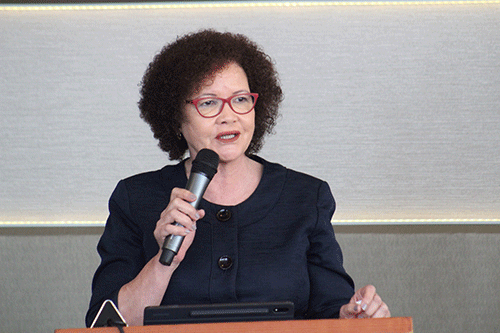DAR ES SALAAM – The East, Central and Southern African Health Community says more should be invested in treating tuberculosis, specifically contact tracing with the inclusion of miners, ex-miners and the communities they live in.
This was stated by Dr Mariam
Urasa, ECSA-HC’s senior programme officer in the family health and infectious diseases’ department at a media sensitisation workshop focusing on the mining sector in Dar es Salaam, Tanzania.
“This type of workshop is important for a country like Namibia because it has a large mining sector that’s both formal and informal, where we get a lot of diamonds and other precious stones. We need to put emphasis on the role of the media to spread the word to the large audience so that those who have been exposed to such environments can be tested and put on treatment, and that requires more investment,” she told New Era.
Urasa said Namibia is one of the countries in the world where 40% of TB cases are not notified.
“Child and adolescent TB is often overlooked by health providers, and can be difficult to diagnose and treat. What we should know is that 30 high TB burden countries accounted for 86% of new TB cases, and eight of them are members of SADC (Angola, DRC, Lesotho, Mozambique, Namibia, South Africa, Tanzania and Zambia),” she added.
Tuberculosis (TB) in the mining sector has long been recognised as a problem in southern Africa. To address this issue, SADC heads of state
signed a Declaration on TB in the Mines in 2012. This declaration directed SADC ministers responsible for health and ministers responsible for finance, migration, local government, labour and mining to initiate the implementation of the declaration and monitor progress.
Tanzania’s senior programmes officer for TB and communicable diseases Charles Sandy said globally, the burden of TB remains high, and deaths from TB remain the biggest cause of deaths from an infectious agent in the last five years.
“Social determinants and financing of TB need to be addressed. Sustainable responses require central government to increase its allocations for health. A healthy population is a necessary catalyst for economic and social development. Hence, member states work collaboratively to address
common issues across sectors,” stated Sandy. The country’s health ministry’s spokesperson Julius Mtemahanji observed that there is a need to strengthen TB services to the population of miners, ex-miners, their families and surrounding communities by 2025.
“The sixth Strategic Operational Plan for the National Tuberculosis and Leprosy Programme foresees a Tanzania free of TB and Leprosy. To us, the mining sector is key in the fight against TB in our country,” stated Mtemahanji.
He added: “The media is a large and by far important tool to be used in this fight, whereby issues of community rights and gender barriers in accessing TB services and stigma to people suffering from TB is still high. It’s only through objective reporting and the creation of awareness on issues relating to TB among community members that we will be able to address these challenges.”
Mtemahanji feels it’s evident that more media practitioners must be reached to make this intervention more relevant.
psiririka@nepc.com.na


